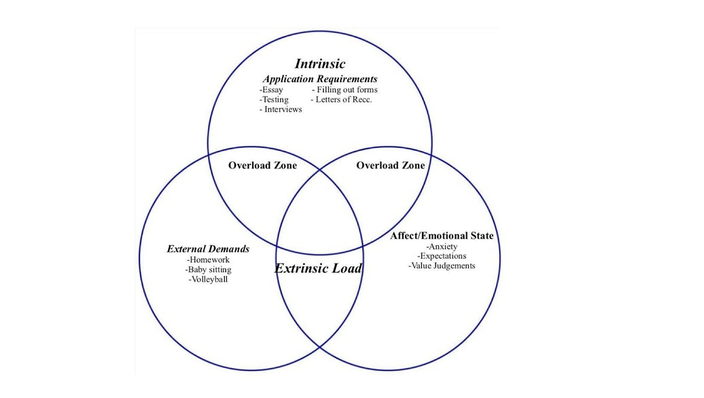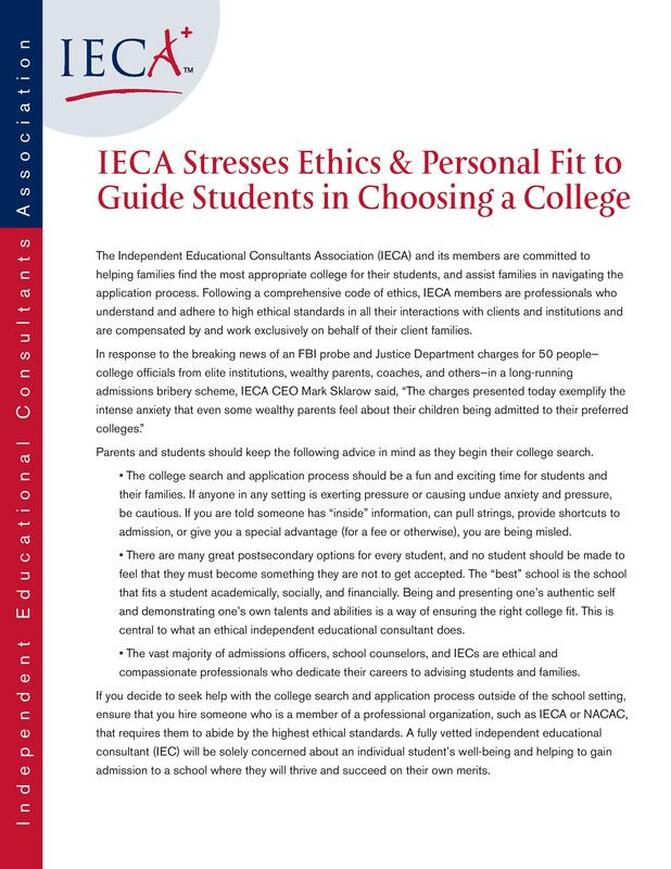|
In light of the recent scandal in college admissions, we want to emphasize the importance of ethical behavior on everyone's part in the college admissions process. Below is a statement from one of our professional organizations, Independent Educational Consultants Association, that reflects our values and practices when working with students and their families.
 The college application process has many moving parts and can seem daunting to many students and their families. We at College Docs strongly suggest starting the process early, either in the sophomore or junior year of high school to have enough time to think about what you are looking for in a college and put together your best possible application. One needs time to thoroughly research and develop a strong college list and to write thoughtful and effective essays. Waiting to the last minute and cramming is not the best strategy either for schoolwork or for the application process. We would like to share an article from our colleague, Dr. Deborah Barany, on the limitations of cramming and the underlying concepts of working memory. CRAMMING AS A PRIMARY STRATEGY: Most high schools set up the need for cramming in order to keep up with the demands of assessment and grading. College bound students often find themselves with 5 or more core classes, all on top of athletics, music, political activism or other pursuits. Compound this with teachers who do not coordinate exams or projects between departments- piling up homework, papers, projects, presentations. Students are overwhelmed with high expectations and little time to work. They work all day at school only to come home to 3+ hours of work at home. No wonder students cram. But cramming interferes with processing and building understanding. Students need more time and exposure to new ideas before building enduring conceptual understanding. While they are building deep lasting knowledge, they also experience longer retrieval time to access new ideas. But our schools are designed for quick processing and memorization. Cramming becomes a survival strategy not a learning strategy. WHY IS CRAMMING PROBLEMATIC? We all have done this in our lives. We put off studying for a test or avoid writing a paper. What is happening when we cram? Cramming heavily relies on memorization and multitasking. We do not have the time to process information deeply which impacts the ability to connect new information with established knowledge. Cramming creates information that is shallow and temporary - just enough to recall on the test or just enough to write a passable essay. For most students this is compounded by two other sources of interference in learning, sleep deprivation and multitasking, which interrupt the deep learning and concept building necessary for producing quality work. Many students are expert crammers because this strategy serves them well and rewards them with grades. But cramming as a primary strategy can backfire when tasks are complicated (e.g. college applications) or the material they are studying is complex and expectations are high (e.g. college level work). CREATING AWARENESS But new strategies and habits can help overcome cramming. First a bit of background: Cognitive Load Theory provides a helpful framework to understand how to overcome the bad habit of cramming. Cognitive Load Theory, first introduced by the cognitive psychologist John Sewell, describes the capacity and limitations of our memory system when presented with difficult problems and complex tasks. New information is first processed through working memory. Working memory is like a train station moving information in and out in order to store new information and retrieve existing information from our long term storage. If you want to keep the information you have to actively process it in order to store it in long term memory. Working memory capacity is very limited, holding between 3 to 5 meaningful pieces of information. It gets crowded in there and if a new input is introduced something has to fall out to make room. This is why multitasking is problematic if you are trying to hold onto and process information. When the information surpasses the capacity of the working memory, our system slows down, stops or jams up. No new information can be stored or recalled. Cognitive load theory not only provides a way of helping students understand cognitive limitations, it also provides strategies for overcoming limitations. In any task there are both intrinsic loads, tasks that are essential to the demands, and extrinsic loads, tasks that are a distraction or unnecessary to the demands. Many students have a hard time differentiating between them. Here is an example of the college application process from one of my students:  HOW TO REDUCE LOAD
A powerful way to optimize our working memory requires consolidating information into meaningful bites. This is called chunking which requires that we break down information into meaningful and important categories allowing us to coordinate, organize and sort intrinsic tasks and acknowledge the extrinsic distractions. By bundling ideas together we can get through the bottleneck limitation of working memory. Chunking is a way to organize and prioritize the various requirements needed to complete the college application. I help my students create meaningful chunks as they define and write out each task on a separate note card or sticky note. I then ask them to collect tasks that “go together.” For example, asking for letters of recommendations or communications with colleges or collecting demographic and family information are examples of chunking task demands. The student is learning to create categories by breaking down the overall process into organized and doable tasks. Rather then piling on additional items on a lengthy to-do list, my students now have a meaningful way to sort out additional actions that require their attention. Co-creating application chunks with my students enables them to take ownership of their process and organize the tasks in a way that makes sense to them. Working with a college consultant offers the opportunity for students to develop new learning habits and approaches as they continue their educational exploration. Helping students to develop new strategies, perspectives and skills will build a toolkit for future learning. Guiding, coaching and practicing together enables our students to feel successful navigating complex tasks with high stake outcomes, like their upcoming college coursework.Keeping the long game in mind, students can fully engage and unleash the power of their brains. If you want to learn more about Working Memory: https://www.ted.com/talks/peter_doolittle_how_your_working_memory_makes_sense_of_the_world?language=en |
Categories
All
Archives
July 2024
Contact College Docs at
203 520-6338 or 203 218-5619 [email protected] |


 RSS Feed
RSS Feed